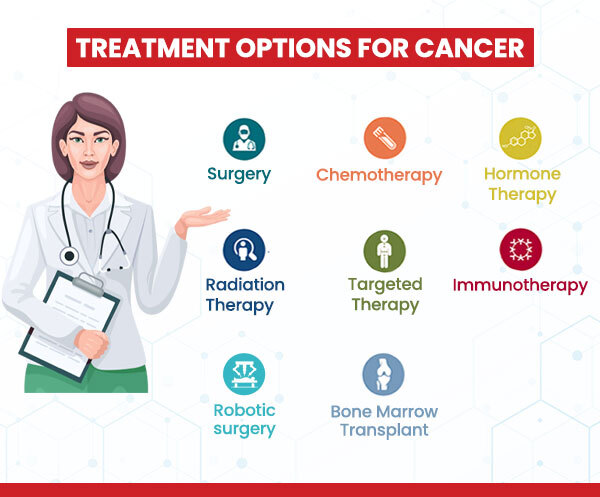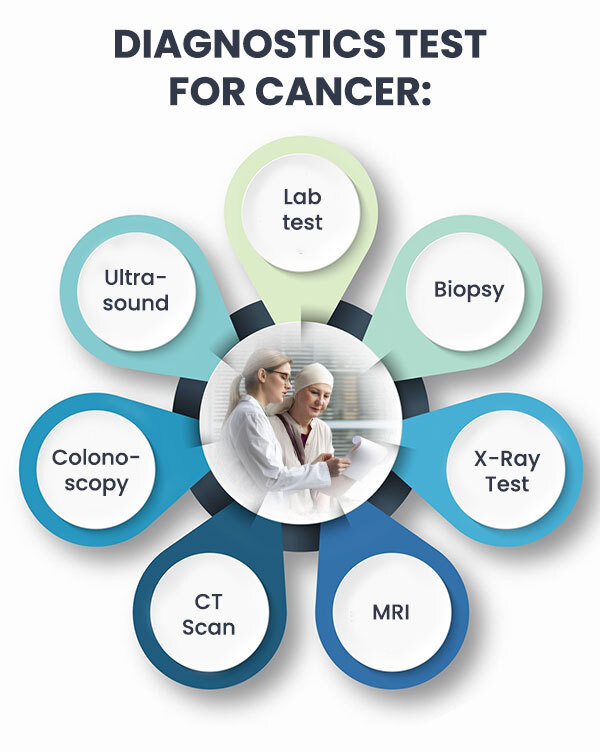The battle against cancer has been ongoing for many decades. According to WHO, around 10 million people worldwide died from cancer in 2020. There have been many advancements in the field of cancer research. Many new and better cancer treatments are now available to patients. Still, the global burden of the disease continues to grow affecting individuals, families, and communities.
If you or your loved one has been diagnosed with cancer then getting the right treatment must be your top priority. Countries like India are popular destinations for availing treatment for cancer as there are many advanced cancer treatments available in the country. In addition to getting timely therapy from an expert oncologist, you also need to consider the cost of your cancer treatment.
The cost of cancer treatment is around 6,300 USD in countries like India. Usually, the survival rate of cancer varies according to its type. For example, the 5-year survival rate for cancers like bladder cancer is 77% whereas it is 98% for testicular cancer.
Types of Cancers, Cost, and Treatment Options
Cancer can originate in any part of the body. The different types of cancers are as follows:
Best Treatment Options for Cancer
Due to the advancement in medical research, there are now many advanced treatment options available for cancer. It is always best to consult with an expert oncologist who can provide you with the best cancer care. The type of treatment you will receive will depend on the type of cancer you have and the stage of your cancer. You may be given a single treatment or a combination of many, depending on your condition. You should discuss and weigh the benefits and risks associated with each treatment with your doctor to understand the best choice for your health. Some of the most common treatments used for cancer are:

- Surgery: A surgical oncologist performs an operation to remove as much of the cancer as possible. Surgery is most commonly used for removing solid tumors that are restricted to one region of the body. Surgery in India can cost in the range of $4000-$12000.
- Chemotherapy: In this type of cancer treatment, drugs are used to kill cancer cells. Since chemotherapy can also affect the growth of normal cells, it can lead to side effects. Some of the common side effects associated with chemotherapy include nausea, mouth sores, and hair fall. The cost of chemotherapy in India can be $600-$700.
- Hormone therapy: This is primarily used for treating breast and prostate cancer. This therapy targets cells that use hormones to grow. By removing the hormones required for growth or preventing their effects, the cancer cells can be stopped from dividing. Hormone therapy can be administered orally or by injection. The cost of hormone therapy in India usually ranges from $3500-$5500.
- Targeted therapy: In this therapy, drugs that target the unique characteristics of cancer cells are used to stop them from growing. This treatment approach doesn’t harm normal cells. The cost of targeted therapy in India is in the range of $8000-$12000.
- Immunotherapy: In immunotherapy, the body’s immune system is used to kill cancer cells. This is also known as biological therapy. Cancer cells can evade the immune system. However, immunotherapy enables your immune system to recognize the cancer cells so that they can be eliminated. Immunotherapy in India costs $3000-$5000.
- Radiation therapy: This uses high-energy beams like X-rays to destroy cancerous cells. The radiation for this form of therapy can be given externally or from within your body(brachytherapy). Radiation therapy’s cost in India is in the range of $4000-$8000.
- Bone Marrow Transplant: This procedure involves replacing the diseased or damaged bone marrow with stem cells that can produce healthy blood cells. It is also known as a stem cell transplant. These stem cells could be obtained from the patient’s body (autologous bone marrow transplant) or the body of the donor(allogeneic bone marrow transplant). Bone marrow transplant is used for treating conditions like Leukemia. BMT cost in India is in the range of $25,000-$35,000.
- Robotic surgery Sometimes, robotic surgery is used to remove the patient’s cancer. This type of surgery is usually laparoscopic and performed when traditional surgery is not the best option for treating the condition. In this, the surgeon will use robotic surgical tools to perform the surgery. Robotic surgery leads to less scarring and pain. It is associated with faster recovery. Some of the cancers that can be treated with robotic surgery are colorectal and pancreatic cancer.
Test Required for Cancer Diagnosis in India
Some of the commonly used tests for detecting cancer include:

- Lab tests: These are usually blood tests used to check the presence of tumor markers, complete blood cell count (CBC), and measure the levels of blood protein. However, these tests cannot be used alone to diagnose cancer. They can help detect blood cancers like Leukemia and multiple myeloma.
- Biopsy: A biopsy is usually recommended when the doctor suspects you of having cancer. This involves taking a small piece of tissue from the region where the cancer is suspected to be present. The sample is then sent to a laboratory and analyzed by a pathologist for the presence of cancer cells. A biopsy helps in the diagnosis of cancer.
- X-ray test: This is an imaging test that can help doctors visualize the changes caused by medical conditions such as cancer.
- MRI: An MRI can be performed to detect the presence of cancer in the body. For instance, a breast MRI is performed to obtain a detailed image of the breast tissue. This can help in evaluating the presence of tumors in the breast.
- Colonoscopy: This helps your doctor to visualize the colon, a part of the digestive system. A colonoscopy can be used to detect potential health problems such as polyps or colorectal cancer.
- CT scan: A computed tomography scan can help doctors in diagnosing cancer. It can also provide information about cancer’s stage.
- Ultrasound: This helps the doctor identify the location of the tumor in the body. Doctors may also use ultrasound to perform a biopsy.
Top Hospitals for Cancer Treatment in India
Top Doctors for Cancer in India
Frequently Ask Questions
Yes. India is home to many JCI, NABH, and NABL-accredited hospitals that aim to deliver excellent care to cancer patients. The country has a pool of skilled and qualified oncologists who are trained in advanced treatments for cancer. In addition to skilled experts, the country also provides treatment to cancer patients at affordable prices. Thus, making India an ideal choice for cancer treatment.
The term metastasis means that cancer has spread from its original location to other parts of the body. Usually, the cancer cells disassociate from the original tumor and then travel via lymph or blood to reach another location to form a new tumor.
Some risk factors can increase the chances of getting cancer. Some of these include:
- Age
- Tobacco
- Alcohol
- Obesity
- Family history
- Chemicals or exposure to radiation
Some of these risk factors can be controlled by making lifestyle changes. But, others like age are not in your control.
A benign tumor is non-invasive and has clear borders. It doesn’t spread and grows slowly. On the other hand, a malignant tumor spreads to other parts of the body via the bloodstream or lymph. Since it spreads fast, detecting a malignant tumor as early as possible is necessary to treat it.
There are different ways in which chemotherapy can be given to you. Usually, chemotherapy drugs are infused into your vein. Alternatively, the oncologist may also give you chemotherapy drugs in the form of capsules or pills. The number of times you have to undergo chemotherapy will be determined by the type of cancer and the drugs being administered. The treatment may be given continuously or with periods of rest.
Cancer is one of the leading causes of death worldwide. In 2020 alone, around 10 million people died from the condition. There has been an alarming increase in the number of cancer cases, especially in developed countries. Studies have linked the increase in cancer cases to unhealthy lifestyle choices like smoking and alcohol and issues like obesity.
Though the exact cause of cancer is unknown, most cancers occur because of faulty genes. The defects in the genes can cause the cells to grow abnormally leading to the formation of tumors. Around 5-10% of cancers are hereditary.
The drugs for cancer work by preventing the cells from dividing. Some medications destroy the area of the cell’s control center that triggers cell division. Other medications stop the chemical reactions necessary for cell division. Thus, if the cells are unable to divide, they die.
Recommended Reads:
Cervical Cancer Treatment: Symptoms, Classification, Diagnosis & Recovery
Ovarian Cancer Treatment: Symptoms, Classification, Diagnosis & Recovery
Prostate Cancer Treatment: Symptoms, Classification, Diagnosis & Recovery
Stomach Cancer Treatment: Symptoms, Classification, Diagnosis & Recovery
Brain Cancer Treatment: Symptoms, Classification, Diagnosis & Recovery
Breast Cancer Treatment: Symptoms, Classification, Diagnosis & Recovery
Pancreatic Cancer Treatment: Symptoms, Classification, Diagnosis



